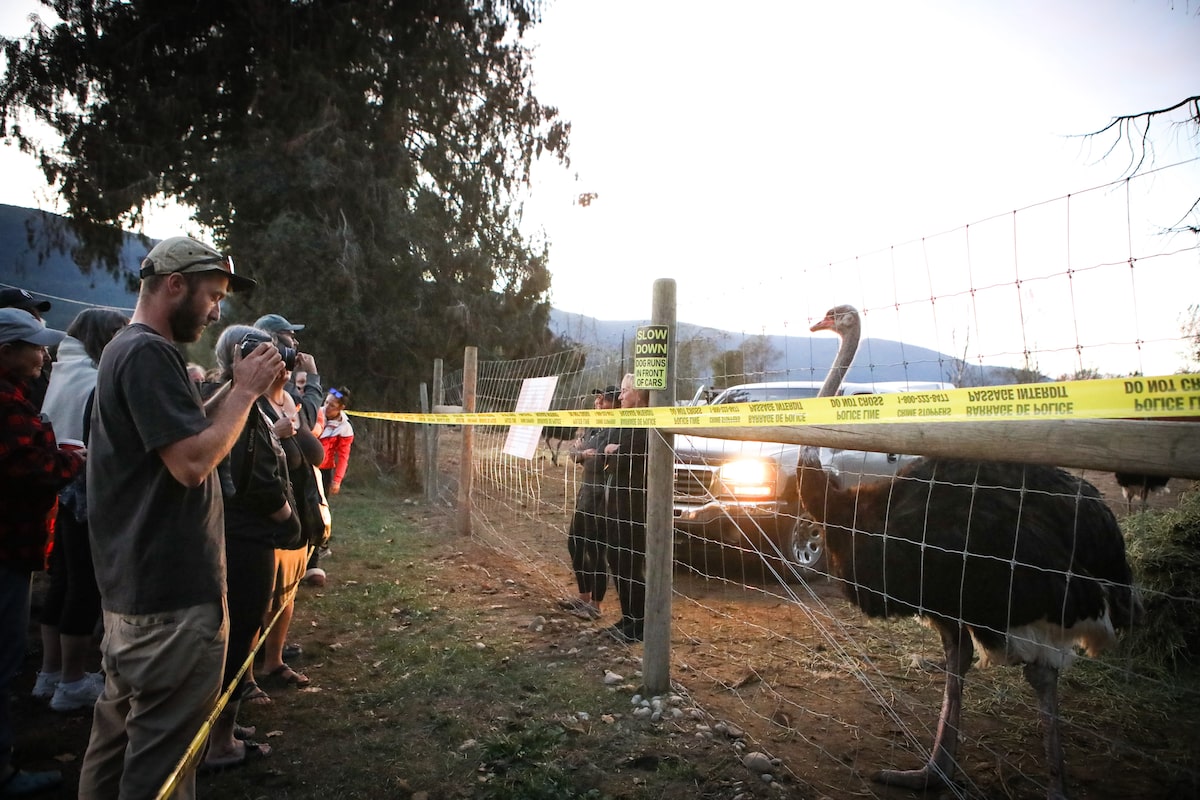Karen Espersen, centre, the co-owner of Universal Ostrich Farms, talks to supporters with her daughter, Katie Pasitney, at the farm in Edgewood, B.C., on Monday.AARON HEMENS/The Canadian Press
The risk that hundreds of ostriches in southeastern B.C. could still spread the bird flu that infected the flock last December is very low, but remains high enough to continue with a federal cull, veterinary science experts tell The Globe and Mail.
Angela Rasmussen, a virologist with the University of Saskatchewan, said that while it is possible to test the birds for avian flu using a PCR test – the same used to test for COVID-19 in humans – scientists would likely need to take multiple samples to ensure the accuracy of the testing.
“That’s really difficult to do because these are seven-foot-tall birds that can disembowel a person by kicking them. It would require a lot of money and resources. And who’s going to pay for that?”
Even if scientists determined that the birds were virus-free, Dr. Rasmussen fears that allowing them to live would not be consistent with the so-called “stamping out policy” that Canada has historically maintained to eradicate avian flu.
Trade partners could still ban poultry imports from Canada, which total $1.75-billion.
Dozens of RCMP officers and workers from the Canadian Food Inspection Agency arrived at the farm in Edgewood, B.C., earlier this week to prepare to kill the birds after the family had lost two court efforts to have the decision overturned.
Owners of the Universal Ostrich Farm have waged a social-media campaign asking for international support for keeping the birds alive. The fowl have garnered attention from U.S. figures such as Health Secretary Robert F. Kennedy Jr. and former television personality Mehmet Oz, now the administrator for the U.S. Centers for Medicare & Medicaid Services.
The cull was halted by the Supreme Court of Canada earlier this week after the farmers filed their leave to appeal and requested a stay of the order while the justices consider their application.
The birds have not been tested in the almost 10 months since two of them tested positive for avian flu.
Scott Weese, an expert in infection control who teaches at the University of Guelph’s Ontario Veterinary College, said he understands the need for the cull, but he said it would be beneficial to test the flock for the virus first.
He agreed with Dr. Rasmussen that the tests would be costly and dangerous.
But without new testing, there is no way to tell if the birds are still infected or releasing particles of the virus, he noted.
Maurice Pitesky, a veterinary epidemiologist with the University of California Davis School of Veterinary Medicine, said if the ostriches are still contagious they pose too great a risk to the millions of waterfowl migrating south from the Arctic.
The CFIA issued a statement Friday, noting that the tests from last year showed the strain of virus found last December at the farm was a unique and more lethal strain of the avian influenza virus.
It says the strain was “among the most virulent” tested at Canada’s National Microbiology Laboratory in Winnipeg. Even low doses killed mice exposed to the virus within a few days.
Gary Mason: Canada wants to kill 400 ostriches. Sadly, it’s the right thing to do
The agency said the virus samples collected at the farm are genetic ancestors of those collected in Ohio and Missouri in late 2024, suggesting the virus migrated from B.C. to both those states, which resulted in a poultry worker getting infected this February.
The CFIA has said in its court filings that it doesn’t know the likelihood that the animals will remain infected.
Three countries – Mexico, Japan and Taiwan – have restricted poultry imports from all Canadian provinces due to avian flu infections. This includes B.C.
The agency said in its statement it has determined there are between 300 and 330 ostriches on the B.C. farm.
A spokesperson for the farm did not return a request for comment Friday, but the farmers have argued that the ostriches were no longer infected and the cull is unwarranted.

